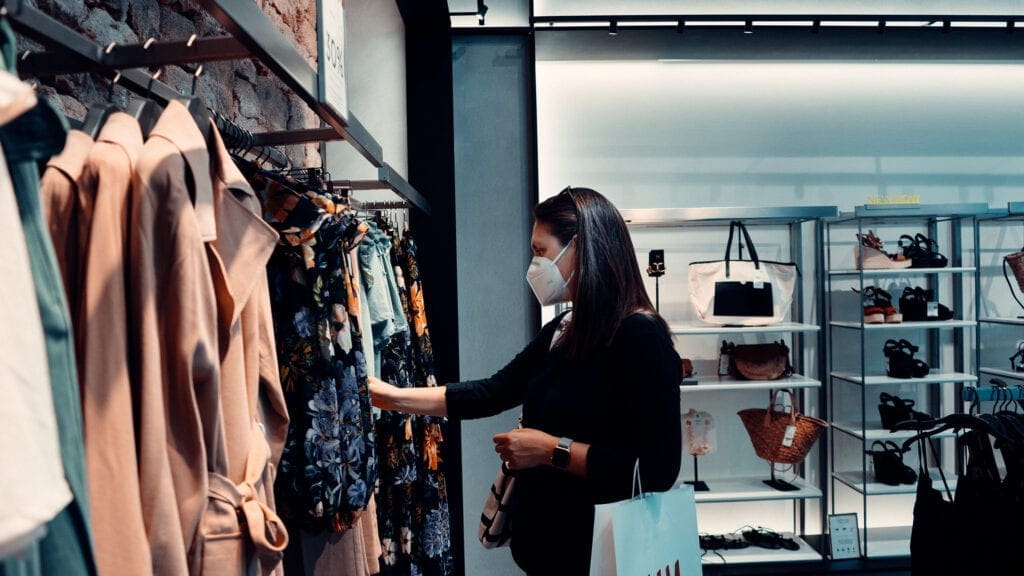Guidance for Businesses During Mask Order

NOTE: This COVID-19 post is over a year old and may contain outdated information. It has been left up for archival purposes only. For the most up-to-date information on masking, vaccines, and more, visit the CDC’s website.
The mask order, which begins on July 1, requires masks to be worn in all public indoor and outdoor spaces including workplaces, businesses, places of worship, community centers, or libraries. This will require your employees and customers to wear a face covering while inside your place of business. Proper face coverings include N95 masks, surgical masks, or cloth masks that cover the mouth and nose.
The mask ordinance outlines the following medical exemptions:
- Those who are deaf or hard of hearing
- Children younger than five years old; and
- Children who are younger than two years old should never wear face coverings due to the risk of suffocation
- Children who are two, three, or four years old, with the assistance and close supervision of an adult, are strongly recommended to wear a face covering at all times in settings, like grocery stores or pharmacies, where it is likely that a distance of at least six feet cannot be maintained from non-household members and vulnerable people must go.
- Persons with a medical condition, mental health condition, or disability that prevents wearing a face covering. This includes, but is not limited to, persons with a medical condition for whom wearing a face covering could obstruct breathing or who are unconscious, incapacitated, or otherwise unable to remove a face covering without assistance.
In order to ensure your business is complying with the local health order and the Americans with Disabilities Act (ADA), we’ve compiled guidelines for how to navigate situations where employees and customers have a mask exemption.
Employees with Exemptions
In the case of an employee with a disability that prevents them from wearing a mask, the employer must provide a reasonable accommodation.
What does reasonable accommodation look like? This could be having the employee work from home or significantly distanced from other employees. In the case of remote work, make sure that the employee can still perform all job requirements – otherwise, it’s not a reasonable accommodation.
In some cases, an employer may deny a reasonable accommodation if it is an undue hardship or a direct threat. Undue hardship must be proved in litigation based on facts (such as disruption to business operations or financial hardships).
Customers with Exemptions
We have created signage that can be posted at your businesses to remind customers of the required mask ordinance. If a customer enters your business without a mask, you can ask them:
- Is (not wearing a mask) an accommodation?
- Are you not wearing a mask due to a disability or valid medical exemption?
If the answer is affirmative, the customer may enter. If their answer is negative, the business may provide an accommodation or they must refuse service. Your employees MAY NOT inquire as to the nature of the person’s disability, request documentation of a medical condition or disability, or require that a person state their disability.
In order to address these issues, we recommend providing information, action plans and training to managers, supervisors and employees on how to address these situations and avoid heated confrontations and/or potential litigation.
Expectations of Businesses
In order to comply with the order, businesses must take the following actions:
- Post signage on all entrances and exits indicating that masks are required in public settings.
- Educate employees about face covering mandates and the exemptions for those who do not have to wear them.
- Enforce the face covering mandate within the confines of the business or organization.
- Actively ask customers who aren’t wearing masks the two questions mentioned above.
Failure to enforce the face covering mandate within the confines of the business may result in a notice of non-compliance which is punishable by fine, imprisonment, or both.
Sources:
- https://www.syracuse.com/coronavirus/2020/05/can-store-owners-require-you-to-wear-a-face-mask-to-enter.html
- https://www.fisherphillips.com/resources-alerts-businesses-that-mandate-masks-for-employees-and
This information is subject to change and may be updated as new research and guidance is released.
Archives
- February 2026 (1)
- December 2025 (1)
- November 2025 (2)
- September 2025 (1)
- July 2025 (2)
- June 2025 (3)
- April 2025 (2)
- January 2025 (2)
- December 2024 (1)
- September 2024 (2)
- August 2024 (2)
- July 2024 (1)
- June 2024 (1)
- February 2024 (1)
- July 2023 (1)
- March 2023 (1)
- October 2022 (1)
- September 2022 (1)
- August 2022 (1)
- July 2022 (2)
- June 2022 (2)
- May 2022 (1)
- April 2022 (4)
- March 2022 (1)
- February 2022 (1)
- January 2022 (1)
- December 2021 (4)
- November 2021 (3)
- September 2021 (2)
- August 2021 (3)
- July 2021 (2)
- June 2021 (1)
- May 2021 (2)
- March 2021 (1)
- December 2020 (6)
- November 2020 (8)
- October 2020 (4)
- September 2020 (7)
- August 2020 (3)
- July 2020 (11)
- May 2020 (2)
- April 2020 (4)
- March 2020 (1)
Categories
- Communicable Disease (5)
- Clinical Services (19)
- Clinical Servcies (1)
- Health Promotions (74)
- Emergency Preparedness (8)





